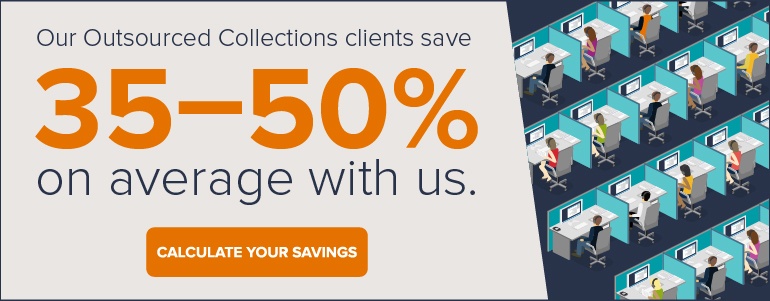Consumer spending behaviors are continuing to shift in 2025, with more consumers seeking flexible payment options to better manage cash flow amid rising costs and economic uncertainty. Buy Now, Pay La...
Optimize Your Outsourcing Efforts: Vendor Management Best Practices
For many financial institutions, outsourcing critical and time-consuming collections efforts is key to saving money and reducing the strain that comes with hiring talented collections teams, especially in a historically tight labor market.
Taking advantage of outsourced collection services can be a cost-effective option if your institution is striving to manage rising delinquencies and trim expenses associated with the collections process.
The top benefits of outsourcing collections include:
- Reduced Collections Costs
- Reduced Delinquency Rates
- Reduced Collection Time
- Increased Collection Rates
- Increased Productivity and Revenue
- Increased Communication Channels (including email, IVR, text, or live agent)
Saving employee time and money with little effort on your institution’s part sounds like a breeze, and these services can, indeed, dramatically reduce the effort required. However, it’s important to note that truly optimizing an outsourced partnership does require some due diligence on your part.
Enter, vendor management best practices.
In this blog post, we’ll share tips to help your institution get the most value from your outsourcing efforts by ensuring that both parties are sharing insights, communicating regularly, and meeting both contractual agreements and performance expectations.
4 Vendor Management Best Practices to Help Optimize Your Collections Partnership
If your financial institution decides to work with a vendor for your collections outreach, it’s vitally important to ensure your partner performs at an optimal level. Here are some tips for laying the foundation of a successful partnership:
1. Share Insights and Communicate Regularly
Reliable collections providers are experts in their fields and typically have access to robust technology and refined processes. Financial institutions should be able to turn to their collections partners for strategic advice on the collections process from start to finish.
Likewise, you know your institution better than anyone and likely have insights into your operations that might not be apparent to your collections provider.
By establishing a cadence for regular communication, you can come together to share these perspectives and work together to ensure your institution is getting the best value for your outsourcing dollars.
2. Get Agreements in Writing
In the compliance-heavy financial services industry, most institutions have lengthy vendor management vetting processes all new contracts must go through (i.e. Service Level Agreements). As such, this probably goes without saying, but if you don’t put obligations and performance expectations down in writing, you have no recourse when a vendor fails to uphold their end of the contract.
While handshake agreements are a sign of trust between parties, putting these agreements in writing helps reduce the risk of disappointment and misunderstanding.
3. Validate Agreements Have Been Carried Out via Reporting
Effective reporting is crucial for evaluating the performance of an outsourced collections provider. Without detailed reports on call volume, queue averages, promise-to-pays, and payment activity, it can be difficult to understand the full extent of their impact on your portfolio.
It is best to choose a vendor that offers customized reporting or, at minimum, provides sufficient information for a comprehensive understanding of their performance.
It’s also important for financial institutions to do their due diligence in reviewing these reports to make sure expectations are being met.
4. Trust Your Partners but Verify Their Work with Periodic QA Checks and Call Calibrations
To ensure you’re getting what you paid for out of your collections partnership, leaders and vendor relationship managers at your institution will initially (and periodically thereafter) need to “inspect what you expect.”
Many institutions seem to take a “set it and forget it” approach to outsourcing—after all, the whole point of outsourcing, to begin with, is to take work off your institution’s plate.
However, adopting this perspective will not work in your best interests—it’s far better to conduct periodic quality assurance (QA) checks (such as listening to recorded calls between the vendor and your borrowers) to make sure the people, products, and technology used are working to your expectations and contractual agreements. After all, you want to make sure you’re getting what you paid for, right?
Conclusion
Outsourcing is useful (and some would argue, necessary), especially in our tight labor market, but it should be a partnership between you and your vendor. It is of the utmost importance to partner with vendors you trust to follow industry best practices and serve your needs dutifully. Further, sharing insights both at the macro and micro level can prove mutually beneficial to the success and overall effectiveness of the vendor relationship.
Vetting vendors is certainly not a quick or easy process. It requires thorough due diligence, but in the end, when you take the time to find the right outsourced collections provider for your institution, it will be well worth the time and effort.
Glenn Williams
Glenn Williams joined SWBC in 2017 and currently serves as the SVP of Contact Center Performance Management. He leads a large team across multiple contact centers that deliver inbound and outbound call services to financial institutions. Over his 30+ year career, Glenn has led large operational teams at two of the nation’s largest Banks and has consulted at two others in the top 10. He has a successful track record creating and managing complex workforce management processes for financial institutions. Glenn excels at performance management, collections operations, program management, and steps into every situation with a problem solvers mentality.


Let Us Know What You Thought about this Post.
Put your Comment Below.